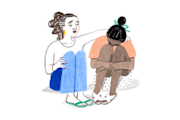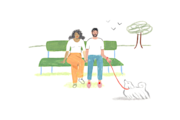If you're asking questions like "How do I know if I'm in a codependent relationship?" or "What is codependent behavior in a relationship?" you might be concerned that you're involved in a codependent relationship.
A codependent relationship is when one partner disregards their own wellbeing in service to the other.
Codependency occurs when one person in a relationship relies heavily upon the other, who in turn feels a desperate need to be needed. More than just a “clingy” relationship, a codependent relationship is when one partner disregards their own wellbeing in service to the other.
Healthy relationships contain compromise (made by each partner), but they also have boundaries.
While codependency is not an official diagnosis in the Diagnostic and Statistical Manual of Mental Disorders, Fifth Edition (DSM-5), it can be associated with dependent personality disorder and anxious attachment style.

Codependency can happen in all types of relationships—not just romantic ones. Relationships between family members, friends, or even co-workers can be codependent.
There are a few warning signs that you might be taking on a codependent role.
For a codependent person—someone who fixates on making their partner’s life frictionless—the line between codependency and being an accommodating and supportive partner is blurry.
It can be difficult to define an acceptable amount of yielding in a relationship, however there are a few warning signs that you might be taking on a codependent role.
1. You suppress your own emotions
If you feel uncomfortable in a situation—whether it's hanging out with your partner’s friends or the way your partner is talking to you—and you don’t bring it up for fear of irritating your partner, you may be codependent.
In any relationship, it's essential that both you and your partner can voice feelings, opinions, and thoughts without worrying about angering the other.

2. You feel like you're losing—or have lost—your sense of self
Have you stopped participating in hobbies that used to mean a lot to you in favor of being attentive to your partner?
While all relationships require compromise, each person in a relationship should be able to maintain independent hobbies, friendships, and identity.
“Loss of self” refers to when one person in a relationship takes on the identity of the other person. Their needs get sidelined while the other person's needs and interests take precedence.
Each person in a relationship should be able to maintain independent hobbies, friendships, and identity.
This can happen in couples that have been in long-term marriages or couples that just started dating a few days ago.
Healthy relationships don’t require total sacrifice of one partner’s life in order to constantly be available for the other.
3. You are constantly anxious you may do something wrong
Codependent relationships often make one person live in such fear of upsetting their partner that they always walk on eggshells around them.
Spending most of your day worrying about how your partner will react to anything you say or do is not healthy for anyone in the relationship.
4. You idealize your partner
Overlooking your partner’s shortcomings—even the most problematic ones—is a sign of a codependent relationship.
Ignoring issues like inability to compromise or emotional manipulation enables the codependent relationship to continue rather than actually solving any problems the relationship may have.
5. You always seek out ways to help your partner but not yourself
If you find yourself going above and beyond to take care of your partner, even when you’re sick, or if you help them with errands when you have a million things to get done yourself, you may be in a codependent relationship.
In a healthy relationship, it’s important to never diminish your wants or needs in order to meet your partner’s wants or needs.
6. You have difficulty making decisions on your own
Would you rather wait for your partner’s approval before making a decision?
Sure, it’s helpful to consult people in your life before making major decisions. That said, a codependent person will have trouble making any decision, large or small, without their partner’s input.

7. You're embarrassed to receive praise
If compliments make you really uncomfortable—not simply shy or coy—you may be codependent.
An inability to accept praise or unwillingness to acknowledge that you have done something well is a sign of codependency.
8. You consistently make excuses for your partner when they mess up
Similar to ignoring your partner’s shortcomings, explaining away your partner’s rudeness by making excuses for them—telling yourself they’re tired or hungry, for instance—is a sign of a codependent relationship.
Codependent relationships often force one partner to give up their beliefs in order to cater to their partner’s needs or wants.
Everyone messes up sometimes, but if you and your partner can’t recognize your partner’s faults and always explain away their mistakes, you may be codependent.
9. You ignore your morals or beliefs in order to do things for your partner
Do you find yourself doing things you would have previously found wrong in order to help your partner?
Codependent relationships often force one partner to give up their beliefs in order to cater to their partner’s needs or wants.
No one should ever have to forgo their morals to maintain a relationship.
What to do if you think you’re in a codependent relationship
If you can relate to several of the examples above, you may be codependent.
The first step to extricating yourself from or even just improving a codependent relationship is to learn about emotional boundaries and how to set some for yourself.
Boundaries are instances where you’re not willing to compromise. Boundaries can be uncomfortable to set at first.
Practice saying "no" to a friend who asks to visit late at night or declining an invitation to your partner's work event.
It might seem difficult or even impossible at first, however practicing can help you to feel more comfortable defining your boundaries over time.
You also might want to seek outside support.
Therapy, whether individual therapy or couples counseling, can help you learn to form healthy relationships and address any underlying experiences that may have contributed to your tendency toward codependency.
If you’re having a challenging time with relationship issues, consider talking with couples counselor and/or therapists with expertise in attachment-based issues.

With a network of over 100,000 counselors, the Monarch Directory by SimplePractice makes it easy to find therapists and marriage counselors who accept your insurance.
Some codependent people have experienced trauma growing up, such as living with a substance abuser or chronically ill family member.
Growing up in a family that’s completely focused on one individual can make it hard to know how to set boundaries and assert your wants and needs in a relationship.
If you’re not ready to talk to a therapist—or if you simply aren’t sure whether you’re in a codependent relationship—you can find information, advice, and maybe even solace in books and online communities or support groups like Codependents Anonymous.
These resources will help you to know that you’re not alone.
Find out your attachment style
Take our 3-Minute Attachment Style Quiz to find out your personal attachment style, and you'll get a free customized report.
Knowing your attachment style is helpful to developing a better understanding of your interactions and behavior in relationships. Results are completely confidential.
READ NEXT: How to tell Your Partner You Want to Go to Couples Counseling
Need to find a therapist near you? Check out the Monarch Directory by SimplePractice to find licensed mental health therapists with availability and online booking.
Berry, J. (2017, October 31). What’s to know about codependent relationships? Medical News Today. Retrieved from https://www.medicalnewstoday.com/articles/319873
Breit, C. (2018, August 2). You may be in a codependent relationship. Here’s how to overcome it. Time. Retrieved from https://time.com/5349927/codependent-relationship-signs/
Robitz, R. What are personality disorders? (2018). American Psychiatric Association (APA). Retrieved from https://www.psychiatry.org/patients-families/personality-disorders/what-are-personality-disorders





